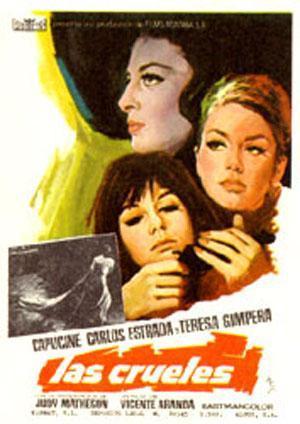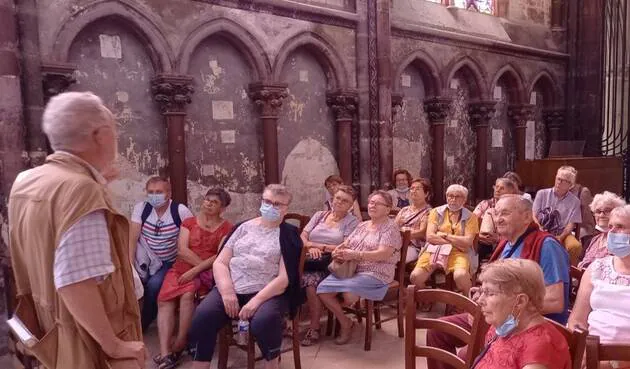the cruel
THE STORY BY ITS AUTHOR
The tower of the ghost is a building in Buenos Aires located in La Boca, to which spectral presences and manifestations are attributed. In several notes, none of them trustworthy, the events experienced in the place are recounted with indolence. According to those chronicles, lazy and poorly documented, a painter named Clementina would have gone crazy there, so she decided to jump from one of the balconies. Those responsible for her suicide would have been certain harmful beings, shaped like mushrooms, brought from the Mediterranean by the woman who had the house built. In the flowerbeds of each balcony those malicious creatures had grown that abused their fantastic condition to penetrate the girls of the lady, who gave up such scenes by secluding herself in the field. After her escape, she put the building up for rent without notifying the tenant, who ended up, as we know, on the sidewalk. Clementina's death would have provoked a dialogue between worlds, based on shouts and whispers, but without direction from Bergman.
I started from that nonsense, because there is no minor question that does not attract me. I mutated the mushrooms, too clumsy, into cruel flowers. I stole a letter from the lady's real last name. I found another one for Clementina. I changed the trellises. And since abusers are usually very unimaginary types, I introduced one into the action, if I may use the verb.
THE CRUEL
Those old world lilies went crazy here. Mrs. Arnaud brought them by boat from France. She thought she was so special that traveling with fine objects seemed little to her and she filled a couple of suitcases with sleeping buds. Arrogant flowers of blue blood, which breathed well in the ship's cabin, where the domestique sprinkled them every evening. So said the lady. Ma tame.
The fury reached the cruel ones as soon as they regained consciousness. This plebeian and humid world of Buenos Aires will not have been interesting to them. The big house in Grasse from which they came was nothing like this corner building with the smell of the port, which the lady had had rebuilt. I was to receive them instead of my cousin, the architect.
The cook resigned as soon as she saw the neighborhood, which was not worthy of her pots, she said. The housekeeper had remained in France. The tasks of the only domestic were several. She had to attend to the cleaning and service while she was busy waking up the flowers and planting them in the pots on each balcony facing the street. Fortunately, she allowed me to keep two rooms on the ground floor. A man is always useful, Arnaud said. I nodded. I am in charge of the maintenance of the common areas. I can occupy the rest of the time in my business, without paying rent.
The lilies grew fast, twisted around the window bars, eager to colonize. The native flora of the flowerbeds, some exhausted carnations, perished in a matter of days. The cruel ones were assimilated to the ghostly plants of the bars that imitate hybrid beings, beings with unruly roots and claws, instead of fingers. The atrocious gesture, sculpted in iron, was well coupled to the violence of the Mediterranean. They twisted to such an extent that the metal was indistinguishable from the living stems. I soon noticed that in my presence the Mediterranean women lowered their heads. It was enough to show them the scissors to make them tremble. I am Creole.
The domestic lived until spring, she didn't even know her name, but she had time to see the plants blooming. She had told me tangentially how her glottis had closed since her arrival, but she attributed it to the change in weather. The girl died without putting up any resistance, in her room, vanished by the window. I had verified that the humidity left her without strength, but I did not imagine that the flower theme would be so effective. After all, they were from her home country.

If I touched her it was thinking she was sleeping, I told Mrs. Arnaud, in the morning. It was already ten o'clock and breakfast had not been arranged. Until today he hadn't had to touch any domestic, least of all, dead.
She accompanied me to see her, distrusting her death. She was shaking it from her when a sweet scent contradicted the bluishness of those lips of hers, and her doubts. The lady pointed at the window to an erect stem of those lilies that seemed more haughty than usual. It was a stiff mystery, like lashes alone. She screamed, Arnaud, without looking at the dead woman again. There was an impudent look in that mouth of hers. Her desire seemed to have caught her in mid-expiration. As if death had interrupted a copulation. Or death was that, a copulation desperate to interrupt.
I had to remove the frozen body of the girl and raise it to the terrace, according to hysterical instructions. Let's not notify the funeral home, better not arouse suspicion. Who would believe that she was a victim of the flowers, said Arnaud. Don't go taking me for delusional.
That night the domestic house burned on an improvised pyre, confused with the Sunday roasts of the adjoining houses.
After the affair, the lady locked herself in the tower and began to speak to herself in French. To the screams I came to think that she had a hidden lover, but then I understood that she blamed the beings on the balconies and scolded them for the dead woman. That she had breathed it in, she said, that the smoke had entered through her mouth and now the domestique resided in her lung.
She did not open the windows or the door of the tower except to ask me for water at any time. She was barefoot, moreover, without washing herself. A sow in heat seemed. In a month she lost several kilos, she was unraveling in rattles. From a small ladder I could see the intact remains of food on silver trays, which were accumulated on the floor. The flies made their feast.
One day the inevitable happened, I found her next to the balcony of the ochava, dejected next to her framework. Lonely and terminal, eyes blank. She wasn't breathing. Thick slime trickled from the corner of her mouth onto her petticoat, and from there onto the flowerbed. I dragged her over to her four-poster bed. I almost rode her, for doing something befitting the tragedy.
DAY 54 Finished Module 7,learnt basic of how to write smart contracts in Java for @Aion_OAN and deployed it on loca… https://t.co/TIlEpiLMys
— Sanjay Kumar Thu Nov 26 09:47:45 +0000 2020
In short, a nest of relatives without fortune ransacked the apartment. I didn't even know of its existence. The rugs, chandeliers, dresses, and jewelry all vanished. No one was interested in the balconies and their strange flowering. Nor did they dare to touch the bed, where the deceased had her wake. Something nauseating was felt in the air. That's what they said. The neighborhood did not seem decent to them, even though they came from the outskirts of Palermo.
They buried the Arnaud and, before dark on the third day, they left me the task of preparing the house for sale. So I warned them about haunting rumors circulating among the neighbors. That the house had a reputation for spooky and the matter could be delayed. That the maid appeared, that scissors flew, and Arnaud's voice was assimilated to the horns of the boats.
In order not to accumulate debts in the meantime, I suggested renting. They gave me the go-ahead. I accepted a certain wealthy painter who was looking for an atelier in the area, whom I immediately located in the tower on the third floor. I left the service area and had the rest of the house for myself.
The summer suffocated every window, and so he kept the tower closed until nightfall on the first day. As soon as the sun went down, he opened the blinds wide, turned off the lights. His figure in underclothes on the almost empty floor, except for the mistress's bed and trestles, was visible from every angle. I couldn't sleep thinking that her body was some kind of trap, a call.
In the morning, she put up racks, unpacked suitcases. The lilies, like me, did not take their eyes off him. The grotesque beings of the bars, either. We spied on her, each of us from her place.
Clementina Castelar got into the bathtub every so often. At night she had trouble sleeping, she tossed and turned in the lady's bed.
The canopy seems to drown, she said out loud once. It must be the acid breeze from the port, the smells from the boats, the filth. The capitoné looks like a pink torso, the fringes, long fingers or hawthorn branches.
She left the bed, and in charcoal she drew herself drawn to the fabric like a bug in front of a flower. From the balconies, the lilies sighed organizing the damage. The parts of the lattice grew, they became harder than the iron from which they were forged. So it seemed to me.
When the painter fell asleep, the fragrances concentrated. They stretched their domains to the edge of the bed. I thought about visiting her, but stopped myself. Who am I to twist the destiny that the cruel have.
However, the next day I found Castelar at the front door. We got into the elevator and I noticed that she was vital, although the street was burning. She borrowed my scissors. I gave it to her. I imagined her slashing her wings, but that night, returning from a certain establishment, I found some of the most beautiful lily buds on the sidewalk. They had stained the tiles with their slime. A stray cat licked the edges.
Clementina drew during the day and pruned at night. In each canvas there is nothing more than amorphous carpels imitating whips or tongues, fatuous angiosperms, that's what she told me, pretending to understand. I avoided looking at her paintings, but I thought I saw that a pubis was confused with the floral motifs.
I decided to sweep what fell onto the sidewalk. Dismembered heads looked like those corollas with a hairy texture. Broken stigmata that were scary to touch. The first time the cat was swollen.
But the real battle was olfactory. The oils and the oil competed with the aroma of the cruel ones. It seemed to me that the beings on the bars were becoming languid, perhaps it was the heat. The old men of the block fell, struck down like some dogs without water.
Miss Castelar no longer dressed even to open the door. She received in a pale shower petticoat. Not just me, anyone. She watched her at all times for not abandoning her impudence. I was anxious that she would resist.
Yesterday, two months after the death of Mrs. Arnaud, I discovered that my balcony doors shake by themselves. It's not the wind. Lilies bristle at night, soon they will double. Not in height. They are thick and swollen. They have lost color and gained weight. They hold water or hate, I don't know. They drip a viscous rennet. The neighbors dodge our sidewalk.
It wasn't even eight o'clock when the painter asked me to close the balconies, a storm is coming. I reluctantly followed her directions, then locked myself in the dining room waiting for her to fall like the others. Finally the house will be for me.
It must have been an hour, I heard a loud knock. I imagined that she had thrown herself from the balcony into the street, I contained myself for a moment. I climbed the ladder, projecting.
But upon entering her study, I discover that the windows have been opened. She, with scissors in one hand and a pair of cruel ones in the other, her milky mouth open, comes towards where I am paralyzed. She puts the latch on the door. She asks me to bite a lily sticking out of her chest. The sweet scent confuses me. The tower stinks. I am afraid of losing my mind or ending up in his place on the sidewalk. Broken and shiny like a severed flower.


